ARCHIVE: This material is no longer maintained and should be viewed for reference only
Competition launched for young researchers using survey data to explore equity in education
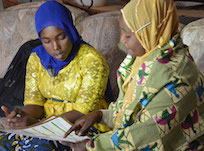
The People’s Action for Learning (PAL) Network has teamed up with the REAL Centre at the Faculty of Education, Cambridge, to launch the 2019 Student Paper Competition in recognition of the outstanding contributions of Master’s and PhD students using Citizen-led Assessment (CLA) data.
The PAL Network is a south-south partnership of 14 countries working across three continents to assess the basic reading and numeracy competencies of all children, in their homes, through annual citizen-led assessments.
The aim of the programme is to find out whether all children are acquiring basic skills - the building blocks of future progress in school – in countries where the information would not otherwise be available. Inclusive and equitable data produced by the assessments is used to inform citizen-led action to improve learning.
The PAL Network is inviting current and recently-graduated Master’s and PhD students to submit their empirical work as an entry into the 2019 Student Paper Competition (deadline 30 November 2018).
Selected authors of the two winning papers will win a fully-funded trip to present their research at the PAL Network biennial conference on 5-6 March 2019 in Islamabad, Pakistan. The conference, titled Ensuring all children learn: lessons on inclusion and equity from the South, is also supported by the REAL Centre.
Dr Ricardo Sabates of the REAL Centre encouraged researchers to enter the student paper competition. He said: “We would like to recognise the talent of early career researchers who use CLA data to investigate educationally relevant topics. These assessments are a powerful tool to help us build a reliable picture of children’s learning and then support citizen-led improvements.”
• Competition entrants should submit a 500-word abstract and full paper (length 6000 words excluding tables, figures and references). Please include your name, your affiliated university, CLA data used and contact details.
• Winners must commit to attend the PAL Network meetings at the conference.
• Submissions should be sent to: REALCentre@educ.cam.ac.uk and conference@palnetwork.org, Please use the subject line Student Paper Competition.
• Entry deadline for the competition is 30 November 2018. The winners will be announced by 15 January 2019.
Pioneering research on student learning gain at university launched by faculty team
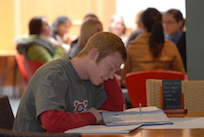
Paul Warwick addresses Oslo conference to launch new Norwegian curriculum strategy
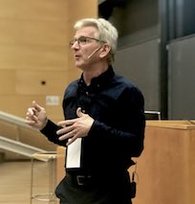
Other keynote speakers were Catherine Snow (Harvard), Neil Mercer (Hughes Hall Cambridge) and John Q. Easton (University of Chicago). A major focus for all the speakers was the development of a more dialogic curriculum, seen as central to the four central competences of the new curriculum, in particular the ‘Competence in communicating, interacting and participating’.
Spellbound: How Hogwarts came to the Faculty of Education
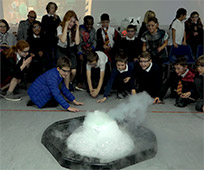
There were spells in the science labs, Quidditch in the courts and even an appearance by an unnervingly authentic Severus Snape when the Faculty of Education and neighbouring Homerton College magically transformed into Hogwarts for the day.
Members of the Primary PGCE team at the Faculty welcomed 96 children from Year 5 at Trumpington Meadows and Fawcett primary schools in Cambridge during the event, designed to complement their study of JK Rowling’s Harry Potter and the Philosopher’s Stone.
Pupils gathered in the Hogwarts Great Hall (remarkably similar to Homerton’s dining hall), where they could admire the sorting hat but choose their own house – no one opted for Slytherin. After a cup of magic potion juice, and an address by Snape, it was off to a potions class run by Faculty science technicians and featuring exploding yellow sludge.
A herbology class in the College’s orchard, focusing on identifying trees, was followed by a Quidditch lesson (ground-based but otherwise entirely realistic).
John-Mark Winstanley, Deputy Manager of the Early Years and Primary PGCE programme and organiser of the event, said:
The Faculty has strong connections with local schools, where many of our PGCE trainees undertake classroom placements. The annual Potter Day gives us a chance to invite pupils and teachers to the Faculty to enjoy some spellbinding science experiments and even Quidditch practice – it’s a lot of fun for all involved.
Pioneering education scheme boosts learning for poorest Ghanaian children, Faculty research team finds
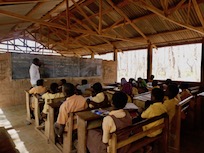
Professor Rose said: “It is exciting to see how evidence is shaping government policy in ways that will increase education opportunities for some of the most vulnerable children in Ghana. The achievements of the CBE programme are striking. In moving forward, it will be vital to tackle the barriers that continue to hold back progress for low-achieving girls.”
• Find out more about the CBE Programme in this short video.
Dr Nidhi Singal to take key role promoting international and comparative education
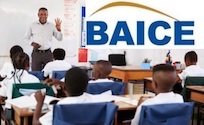
Dr Nidhi Singal, a specialist in educational inequity in South Asia and Africa, has been elected Chair of the leading UK body promoting international and comparative education.
Dr Singal, whose research focuses on the educational experiences of children and young people with disabilities in Southern contexts, was welcomed as Chair of the British Association for International and Comparative Education (BAICE) at the association’s 20th Anniversary conference this month. BAICE is the British affiliate of the World Council of Comparative Education Societies (WCCES), and is committed to promoting research, teaching, policy and development in all aspects of international and comparative education.
Global challenges, including enforced migration through conflict or environmental change, require radical new approaches to providing and understanding education, Dr Singal said.
"In BAICE we are increasingly aware of the need to address new challenges facing education in our times. For example, schooling in the context of forced displacement, addressing the needs of the most marginalised, and the place of education within sustainable development.
These issues take us outside the framework of nation states and the contexts of compulsory formal education that many of us work on, challenge assumptions about the value of education, and the most desirable modes of educational provision. Addressing these issues requires us to seek new ways of thinking, build new knowledge alliances with different disciplinary areas such as philosophy and history to name a few, so that we are not complacent in our intellectual habits."
Speaking at the BAICE conference, Dr Singal said closer engagement was needed between professional bodies and disciplinary areas to further enrich the field of international and comparative education.
She called for a greater focus on 'contexts'. "We need to understand where education happens, but must also keep in mind that when we come into those contexts we understand them through the practices and methodologies of the contexts in which we were trained."
BAICE will continue to encourage Southern scholarship, promote alternative discourses and re-imagine new possibilities for the future of the field, she added, as well as nurturing and building on the spirit of mentorship and guidance for early career researchers which is key to its vision.
Professor joins new research network on child wellbeing in digital age

Prof McLaughlin, a specialist in emotional wellbeing in schools and leader of the Educational Reform and Innovation team at the Faculty of Education, will advise the e-Nurture Network, one of eight new Mental Health Networks announced by UK Research and Innovation (UKRI).
Each multi-disciplinary network will bring researchers, charities and other organisations together to address vital mental health research questions.
The e-Nurture Network will research and promote the mental health of children and young people in the context of a digital world, with an emphasis on supporting positive family and school life. Prof McLaughlin will join the advisory board with a particular focus on education.
Researchers will look at how the digital environment has the potential to both positively and negatively influence children’s well-being, mental health and development. The group will examine how parents, teachers, practitioners, policy makers and young people themselves can be equipped with information, support and resources that promote positive mental health in a digital age.
The e-Nurture Network, led by Professor Gordon Harold of the University of Sussex, will focus its work around three strands of activity:
• Identifying how to effectively incorporate and disseminate this new knowledge to influence both mental health practice and the design and development of a new generation of digital platforms and interventions aimed at promoting mental health for young people.
Collaboration
The eight new networks, supported with £8 million of funding over four years from the new UK-wide research funding body UKRI, will emphasise collaboration. They will each bring together researchers from a wide range of disciplines, including health, medicine, biology, social sciences, humanities and environmental sciences.
Professor McLaughlin said: “This network is very welcome news indeed and a significant national and international recognition of the importance of working in an inter-disciplinary way on mental health in schools.
“Children are growing up in a digital world that is transforming their lives in ways we are only beginning to understand, at school, at home and with their friends. Those changes can have both positive and negative implications for their mental health. We want to know more about that complex picture so we can provide the most informed responses to support the mental health of children and young people.
“We are proud to be part of the new network and look forward to the generation of new and ground-breaking practice and research.”
Life hacks for graduates: top tips for smoother studies

A selection of the posts, produced by our graduate student organisation FERSA and collated here, bring together hard-won experiences and creative ideas to help you navigate your way through your time in Cambridge as productively – and happily – as possible.
Among the hacks recommended by our community are befriending librarians, using giant paperclips (read the life hack post to find their application!), and employing smart software to support your research while also keeping your attention on track (our grads have
tried and tested an array of options so you don’t have to). Then there’s advice on conferences, writing, publishing… The list goes on.
Do check out the blog posts below, and take a look around others on the FERSA Cambridge blog site too for more inspiration. And don’t forget, once you’re here you can contribute your own posts to share your research and ideas with your own successors.
Happy reading – and let us know what you think!
How do we manage digital distractions?
Some helpful tips and strategies for managing our digital distractions to become happier, more productive graduate students.
How to manage your time
Learn about how to balance writing a thesis, publishing papers and gaining teaching experience.
The PhD life hack
Are there any tools or strategies that can be particularly helpful to know about when starting a new graduate program? Current research students and academics share their best PhD lifehack.
Finding my research interest
Some thoughts on the process that leads from curiosity to a research project.
My PhD journey in 8 pictures
A fun and informative visualisation of the stages of doing PhD in Education.
If I were to do my PhD again
What would you do (or not do) if you could do a PhD again? Some valuable reflections on the entire PhD experience.
Coming of age: conference explores the complex power of the picturebook

Even older is The Dogs’ Dinner Party, published in 1855 and featuring a moveable book mechanism known as “Living Pictures”. Each scene can be animated by moving card tabs to bring the canine characters to life.
• For more information, contact Lucy Ward, Communications Manager, Faculty of Education: news@educ.cam.ac.uk
• Watch our short film about picturebooks and the exhibition
• The Curiouser and Curiouser exhibition at Homerton College Library is open during Open Cambridge on 14 and 15 September. On Friday 14 September 5.30-6.30pm there will also be a free talk on picturebooks by Morag Styles, former Professor of Children’s Poetry at the Faculty of Education and an Emeritus Fellow of Homerton College.
New Silk Road links bring challenges for universities, says Faculty's Professor Susan Robertson
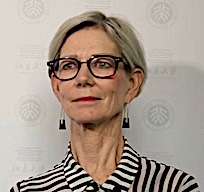
Delivering the keynote address at the first Eurasia research summit hosted by the THE, Professor Robertson – who takes over as Head of Faculty next year - highlighted the need for a “re-mooring” of universities in response to geopolitical change.
It was important to identify the conditions that would ensure schemes such as China’s plan to develop a new economic “belt” through the Eurasian countries of the ancient Silk Road brought together East and West, and avoided a competition-driven “Wild West”, she argued.
The Belt and Road Initiative (BRI), also known as OBOR (One Belt One Road), consists of a land-based belt of new transport links and other developments, together with a Maritime Silk Road of ocean-going trade routes between China, Africa and Europe.
“What conditions need to be in place so that the promise of OBOR – that of East AND West, delivers multipolarity and not a new unipolarity?” Professor Robertson asked at the event in the Republic of Tatarstan, Russia.
Higher education had long been global, despite the widespread Western belief that universities began in Europe, she added. Now, universities were facing dramatic new and disruptive challenges, including digital forms of delivery and new players in the sector. With the re-opening of ancient trans-Eurasian connections, it was time to consider new models for university development to balance global and national brands without losing sight of local development priorities.
Universities would need to manage partnerships and collaborations that respected different institutional cultures while also ensuring the distinctiveness of local and national cultures and experiences, Professor Robertson argued.
Questions still to be answered included how to ensure higher education benefits from new technological advancements to enable strategic regional growth, and what kind of data would be needed to make better decisions.
Universities are at their best when they are open-minded and outward-looking, value plurality and dialogue and understand their mandate to create and circulate knowledge, she concluded. “If this aspiration can be bought to the table as a new world of Eurasian higher education emerges, then an excess of competition as the driving model of development into the future can be mediated by a willingness to cooperate in the interests of global stability and institutional sustainability.”
Methods in learning research and educational theory conference at the Faculty
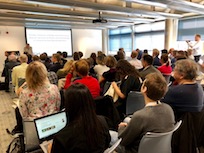
Book award for Faculty Primary Literacy specialist
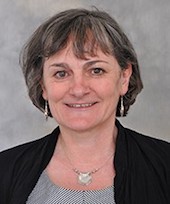
Mary Anne Wolpert, Deputy Course Manager for the PGCE course at the Faculty, was named one of the authors of the month for September for the latest edition of the best-selling book, Teaching English, Language and Literacy. She shares the award with co-authors Dominic Wyse and Helen Bradford.
The book, out in September in its fourth edition, is regarded as the leading comprehensive, research-informed guide to the teaching of English, Language and Literacy. In addition to its attention to theory and research evidence, it includes critiques of relevant educational policies as part of ensuring that its key messages support improvements in teaching and learning.
The new version of the book has been revised to reflect reviewers' responses and the authors' own reflections and incorporate the latest research and updated discussion of effective teaching. Mary Anne's particular contribution to this edition is the section on the teaching of reading, which includes a focus on children’s literature and the importance of reading for pleasure. In addition, she has updated the chapters on inclusive pedagogy in literacy education and classroom practices for talk.
The award comes as Mary Anne leaves the Faculty after 13 years to continue her career in ITE and teacher education in New York. A much-respected colleague, she will be greatly missed in Cambridge, but her influence continues in the work of hundreds of Faculty-trained Early Years and Primary teachers.
REAL Centre at the Global Disability Summit
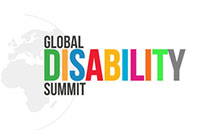
Signed by over 30 organisations, a Statement for Action to 'Accelerate Equitable and Quality Inclusive Education for Children and Youth with Disabilities' was prepared for the Summit. The Statement of Action was a key outcome of a Workshophosted by the REAL Centre and Impact Initiative in April, which built on over a decade’s research on disability and education in Southern contexts undertaken by Faculty members. Download the Statement for Action here.
During the Summit, commitments were made by Ministers of Education and international donors such as DFID, UNICEF and the World Bank to collect data using questions developed by the Washington Group on Disability Statistics. Collection of data using the Washington Group’s Child Functioning Module for the REAL Centre’s Teaching Effectively All Children (TEACh) project (funded by ESRC and DFID) and work done with ASER (Pakistan) shows that many children with disabilities are in mainstream schools in India and Pakistan, but that appropriate strategies are needed to ensure they have the same opportunities to quality, inclusive learning as their peers.
Also at the Summit, the UK Secretary of State for International Development, Penny Mordaunt announced a new Inclusive Education Initiative, together with support from Norway and the World Bank. The Initiative intends to provide technical expertise and resources to countries to help catalyse their progress in reaching children with disabilities through support to inclusive pedagogies and learning environments. The REAL Centre is pleased to have supported Norway and DFID in advising on the framing of the Initiative, in collaboration with the Education Development Trust.
REAL Centre PhD student Julia Hayes was at also at the Summit, using her illustration skills to sum up messages for action and change on inclusive education.
To coincide with the Summit, an opinion piece authored by Nidhi Singal with Nafisa Baboo (Senior Education Advisor, Light for the World) on the need to commit to inclusive education for children with disabilities was published by Devex.
Read more about commitments made at the Summit here.
Faculty welcomes Sutton Trust summer school students
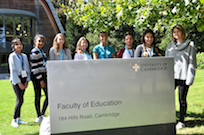
The Year 12 pupils, who will be applying to university in the autumn, are taking part in a scheme run by the Sutton Trust charity, which aims to improve social mobility by boosting access to leading universities for young people from low-income backgrounds.
The students stay in colleges at Cambridge on the week-long course, and enjoy a range of activities designed to give them a taste of academic life, together with social events such as a dinner in a college Hall.
At the Education Faculty next week, eight pupils will find out more about the Cambridge undergraduate degree in Education. They will focus on Education in combination with English, drama and arts - one of three “tracks” or specialist options available on the BA course alongside psychology and international development.
The schedule will include a lecture from Professor Paul Ramchandani, head of the PEDAL play research centre at the Faculty, who is also known as the Lego Professor thanks to sponsorship of the post by the Lego Foundation. The students will be given an introduction to the Faculty’s much-loved library, and will be able to use its resources to conduct a short piece of research.
They will also present their research to their group, and take part, in pairs, in a supervision - the small-group teaching method used in Cambridge.
The introduction to the Education with English and drama course also includes a visit to the Globe Theatre in London to see Shakespeare’s Othello, and students will have a chance to wind down with a punting trip on the river Cam.
This is the second year the Faculty of Education has hosted a Sutton Trust summer school linked to one of the three new tracks of the Education BA; last year the event focused on the Education with International Development degree course (the visiting students are pictured above).
Other Sutton Trust summer schools are being hosted this summer by other faculties around the University of Cambridge.
Hair today: real-world language under the spotlight at TaLC conference

Some 140 academics, teachers and software developers from all over the world will gather for the 13th Teaching and Language Corpora Conference (TaLC), being held at Cambridge University’s Faculty of Education from 18-21 July 2018.
Language corpora are collections of texts, both spoken and written, that allow learners to understand the way a language is used in the most up-to-date way in real life situations, showing – for example – the way individual words can combine differently depending on the type of communication. The approach, known as Data-driven learning, means learners can experience real, everyday usage instead of the limited exposure to authentic language found in second language learning textbooks.
It also paves the way for better understanding of language use among particular groups, with the possibility of improving communication in situations – such as air traffic control or among military personnel – where clarity is vital.
Launched in 1994, TaLC has become ever more relevant in the era of big data and data skills, when amassing examples of the way language is used in particular situations or among certain groups is increasingly possible though computerised analysis. TaLC aims to promote classroom applications of language corpora, data-driven learning, as well as the creation of corpus-informed teaching materials and other resources, and foster discussion between practitioners, researchers and theorists from all over the world.
Dr Pascual Pérez-Paredes, a Lecturer at the Faculty of Education and chair of the conference organising committee, said the founders of the biennial event had proved exceptionally farsighted in identifying the possibilities of using language corpora when such computerised analysis was still in its infancy. “The first TaLC conference was held in 1994, when a computer cost £1,500, which was far more then. The founders were pioneers, researchers that envisaged the power of data and data analysis skills for language learning!”.
Conference participants are mainly applied linguists with an interest in language education, said Dr Pérez-Paredes. “We put together lots of texts coming from different sources, including newspapers, fiction, spoken conversations, speeches. We look at how language works in those different contexts, and we learn more about how the context, the speaker, the situation and the words all interact and come to life in real communication as opposed to the maybe more stereotyped, prefabricated language we find in textbooks.”
The boom in studying language corpora has been so great that TaLC organisers could only accept half of the papers proposed by researchers for this year’s event. The packed four-day programme will feature 75 presentations, 4 plenaries, 16 posters and 6 ground-breaking workshops.
In one of them, Cambridge University Press will show how the 55-million-word Cambridge Learner Corpus can contribute to our understanding of language learning development across the lifespan and the creation of corpus-informed teaching materials.
Presentations include studies in vocational schools, English in professional contexts and, among many others, analyses of narrative texts in secondary school text books for learners of English as a foreign language.
Chain reaction: how Tinkering can link disadvantaged students with science
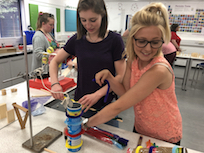
Fifty PGCE science students donned themed costumes and worked in teams to build sections of the spectacular Heath Robinson-esque construction, eventually joining the elements together to send a domino effect from one end to the other. The final sequence tipped Mentos mints into Coke to create a fizzy drink fountain – greeted with loud applause.
The end-of-term activity was inspired by the work of the Tinkering 2 EU project: an EU-funded scheme exploring the use of “Tinkering” to help disadvantaged young people engage with science, technology, engineering and maths (STEM). The Education Faculty at the University of Cambridge is a project partner.
Pioneered by the Exploratorium museum of science, art and human perception in San Francisco, Tinkering encourages people to “think with their hands” in order to build skills, knowledge and understanding, particularly in the areas of STEM and the arts (combined as STEAM). Described as both a process and a mind-set, the Tinkering approach - making something through designing, testing and refining rather than following instructions - develops personal attributes and skills that all contribute to innovative ways of thinking and doing.
The chain reaction challenge is the sort of activity the Tinkering EU project will be rolling out with students aged eight to 14 across Europe who are facing social and economic disadvantage and have fewer opportunities to engage with STEM outside of school. Working with teachers and museum professionals, it offers a different way to look at science education and engagement and is a powerful tool to develop active citizenship, employability and social inclusion.
PGCE staff at the Faculty use Tinkering to help teachers think about STEM learning in a way that is highly personalised and which can help engage all students, particularly those with less access to science-related activities.
Dr Mark Winterbottom, Senior Lecturer in Science Education at the Faculty of Education, said: “Tinkering is a fantastic way to help build trainee teachers’ ideas about how to support students’ STEM learning. We are delighted to be involved in Tinkering 2, setting out the intellectual framework behind the initiatives taking place as part of the project across Europe.”
‘Tinkering EU: Building Science Capital for All’ (http://www.museoscienza.org/tinkering-eu2/) is an EU-funded transnational collaboration project.
Cambridge educators to train thousands of teachers in China
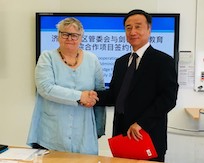
The Education, Reform and Innovation (ERI) team signed a contract this month with Jinan Innovation Zone in Shandong Province, Eastern China.
Over the next three-years, ERI will establish professional learning hubs with the goal of reforming initial teacher education and teacher development. The first year will focus on comprehensive training of in-service teachers and teacher educators, in line with ERI’s sustainable partnership-building approach. The project will continue by establishing a framework for sustainable development and then collect research on the impact of the reforms.
A key goal is to ensure teacher educators gain a good evidence-based understanding of the theory of teaching, and develop them as practitioners of professional learning. Students will be developed too, with a focus on better use of digital technology for self-learning, and improved skills in reading, talking and writing.
The Jinan Innovation Zone, which has good connections to Beijing in the north and Shanghai in the south, aims to become a new economic, financial, logistics, scientific and technology centre within China.
ERI specialises in research-informed systemic education reform, and is involved in a range of international projects of development, research, monitoring and evaluation.
The team has worked in Kazakhstan since 2011 supporting education reform through capacity building, teachers’ professional learning, and by conducting collaborative research projects.
ERI has established other links in China, including engaging with Peking University to cooperate in the field of Early Years Education.
Why aren’t MOOCs changing the world? – essay by EdFac student wins top award
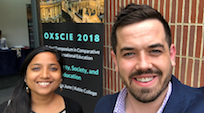
Michael Meaney, a Gates Cambridge Scholar, won an essay prize at the prestigious 2nd Oxford Symposium in Comparative and International Education (OXSCIE), held this month at the University of Oxford. The theme this year was the complex intersections between education, changing society and uncertainty, and entrants were challenged to explore how education can shape a plural and prosperous but also inclusive and cohesive society.
Michael’s essay, The Future of Social Mobility? MOOCs and Hegemonic Design Bias, questioned whether MOOCs (Massive Open Online Courses – usually offered free by universities via the web) are helping address the ever-widening global gap between and demand and supply of higher education as technology transforms the labour market. The poorest are least likely to have access to higher education, and therefore cannot get higher-paid jobs requiring degrees, further entrenching disadvantage.
Though they have been heralded as a potential solution to the problem, MOOCs are in fact exacerbating it because they are primarily designed by those institutions at the top of the current inequitable model of higher education, Michael argues.
The “hegemonic design bias” he identifies arises partly because most MOOCs are developed by “prestigious universities that derive their prestige based on whom they exclude, rather than include, and this pattern seems to be replicated in the course content and teaching style of their MOOCs”.
Secondly, Michael argues, the online courses are designed according to “stale and retrograde pedagogy” based on the idea of knowledge transfer rather than knowledge co-creation. Finally, new MOOCs are designed based on data from existing courses, perpetuating the model suited to already college-educated users who are less likely to need them.
MOOCs still have huge potential for reducing social inequality, but it will be up to universities to embrace it, Michael concludes. “If proper design considerations are made in creating future MOOC content, these institutions of higher education could make a momentous contribution to society by truly democratising learning.
“As MOOCs remain nascent, they are highly malleable and not entrenched in any specific way that would prevent a direction change. Whether MOOCs are able to shift in the right direction is now up to the universities producing them."
To widen audiences, he suggests, universities should make use of ethical design paradigms that place the intended users - those without college degrees - and their unique and specific needs at the centre of the design process. He is also hopeful that social psychological interventions that make courses more inviting and less threatening might also be implemented more widely to improve outcomes.
Some 650 papers were submitted in the essay competition, 28 were selected for presentation and Michael's was one of five awarded best essay prizes. The essay will be adapted for submission to the Cambridge Faculty of Education Working Paper Series, as well as for publication in a journal.
Michael said: “I am especially thankful to my supervisor, Ricardo Sabates, for always pushing my thinking and providing technical support throughout my PhD. My fellow PhD students at the Faculty of education sharpen my thinking and force me to contend with systems of analysis I am not familiar with, which strengthens my own research.”
Also shortlisted for the essay prize was an entry by Meghna Nag-Chowdhuri, a fellow PhD student at the Faculty. Her essay focused on the notion of value in mathematics education, exploring it by comparing the National Curriculum Framework of India (NCF 2005) and a successful mainstream Hindi film - Nil Battey Sannata. In the comedy-drama, a hard-working single mother attempts to boost her unmotivated daughter’s maths grades by enrolling in school alongside her to learn enough to be her tutor.
Meghna said: “By using Julian Williams' (2011) notion of 'exchange' (providing access for economic benefits) and 'use' value (intrinsic value for psychosocial development) of learning of school mathematics, I explored the meaningfulness of mathematics in the lives of millions
of marginalised students entering mainstream formal education in India.
“The expectation of mathematics as being the solution to social immobility is probably highly exaggerated (such as the film), yet its potential use value is barely understood. Recent policy documents have attempted to reimagine the aims of mathematics to locate the ‘use’ value in disciplinary mathematics, but it is still to be seen if this can be of any use to the many marginalised students who will most likely not either pursue mathematics or mathematics related professions.
“The one notion related to the use value which comes out strongly both in the film and the policy document is connecting mathematics to daily life. This theme which seems to be explored superficially in the film, can become the starting point of research on what mathematics can mean for the majority. Unless these are explicitly researched, mathematics’ exchange value will continue to dominate the large majority who will
continue to live in uncertain circumstances with the hope that mathematics will set them free.”
Meghna, currently in the third year of her PhD, is working on a multiple case study of primary school teachers in government schools in Delhi, India. Her work tries to understand how teachers view and use reform based mathematics textbooks.
She said: "It was exciting to be a part of a diverse symposium of scholars, practitioners and policy makers, thinking together to understand the role of education in the socially and politically uncertain world we live in. To bring in ideas from my own research into this collaborative process gave me the chance to make a small contribution in the field of education."
Image: Cambridge Education Faculty PhD students Michael Meaney and Meghna Nag Chowdhuri at the awards ceremony
EdFac student wins University prize for highest score in data analysis paper

Nicole received the CUQM/Sage award for her mark in the SOC5 (statistics and methods) paper. The paper, which covers both quantitative and qualitative research methods, is open to all social science undergraduates and is chosen by several students taking the BA course in Education each year.
Education students receive supervisions for the paper from Dr Sonia Ilie, a Senior Research Fellow at the Faculty of Education and specialist in quantitative data analysis. Last year, another Education student, Vicky Zhao, also taught by Dr Ilie, gained the highest mark in SOC5 and won the prize.
Cambridge University founded the Cambridge Undergraduate Quantitative Methods centre (CUQM) and created the award to boost performance in data analysis skills. The prize is worth £100 in books from publishers Sage.
Dr Ilie said: "This shows that in the Faculty of Education we have an expanding interest and focus on quantitative methods alongside all other methods of analysing data, so giving students a rounded view of research methods.
"In addition to exceptionally high individual scores, Education students taking the paper consistently achieve firsts and 2:1s, reflecting an overall high standard. I'm proud of our students: they have done very well."
Nicole said: "It was both a surprise and delight to be awarded this prize from CUQM/Sage, for which I only have Sonia to thank for her hard work and dedication this academic year. I hope to bring the knowledge and skills I have gained from the paper in the future to pursue a career in policy research that addresses the inequalities of the UK’s higher education access.
"Though many peers, like myself at the initial stages, may be uncertain about the course because they may not be confident in mathematics, I was pleasantly surprised to find the course content to be manageable, accessible, approachable, and that A-Level (or equivalent) Maths was not required. On that note, I highly urge any Education peers who are considering the paper not to be put off by idea that there are numbers involved, as it is such a rewarding course!"
Vicky, last year's prize-winner, is continuing her studies at the Faculty of Education after graduating in 2017. Her Master's dissertation compares the impact of education, rural-urban divide and social capitals over social mobility in the Chinese context, using secondary data analysis of the 2012 Chinese General Social Survey. She said: "SOC5 absolutely changed my career plan. I always knew that I would like to pursue a Master's degree but I wasn't sure what would happen after that. While I was preparing my application, I consulted the most amazing supervisor, Dr Sonia Ilie and she suggested I should use the advantage of my physics and maths skills. She introduced me to SOC5, which enlightened me so much on the power of figures in explaining the social world.
"I became so passionate about quantitative analysis and educational research in general that I decided to pursue a PhD degree, so I will start my fifth year in the Faculty this coming September."
German “school of the future” project takes lessons from Faculty research
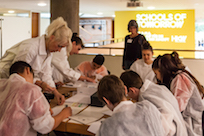
The It’s Our School! competition, run by the House of World Cultures (HWK) in Berlin in conjunction with Die Zeit publishing, invited pupils aged five to 19 to share their vision of a school of tomorrow: a place that would prepare them for the future, making learning more meaningful and knowledge more fun. Inspiration for the contest came from The School I’d Like, a competition launched by the Guardian newspaper, working with Dr Burke, in 2001 and repeated in 2011. The UK initiative, coordinated by the journalist Dea Birkett, produced a wealth of imaginative and innovative ideas, many focusing on changing schools’ “sausage machine” timetabling, improving the built environment and ensuring inclusion for all.
The new German version of the project, overseen by a panel of invited experts including Dr Burke, prompted participation by around 2,000 students from 27 countries, many from German schools abroad. Winning entries, announced by the project’s patron Bundespräsident Frank-Walter Steinmeier, included a series of pictures depicting the school of the future and a video titled Ode to the School.
Children entering the competition, part of a year-long Schools of Tomorrow programme run by HWK, proposed ideas including “a system for all children to play together”, a day at home each week for pupils to work independently, more time to run and more outdoor learning, and cats in class to stroke while working.
There was a great deal of consensus between German students and the UK counterparts on what made a good school, said Dr Burke, Reader in History of Education and Childhood at the Faculty of Education. Common priorities included being treated with respect, making learning connect with real issues, reducing pressure and stress and providing beautiful, comfortable and well-designed school environments that support a variety of ways of learning. Children in both countries also called for the provision of quiet or withdrawal spaces to support individual reflection or study, live animals and plants to look after, and calm, friendly teachers who are experts in their subject and can engage fun ways to learn.
There is evidence that ideas presented by children in The School I’d Like project have influenced school design, notably the new Cambridge University Primary School, according to Dr Burke. She said: “The School I'd Like collaboration with the Guardian newspaper in 2001 has had enormous impact nationally and internationally. It has stimulated similar initiatives to engage children and young people to reflect on the design of education in the widest sense, in Australia and in Germany. The book based on the project I wrote together with Ian Grosvenor [The School I'd Like: Children and Young People's Reflections on an Education for the 21st Century] has been translated and published in Chinese and revised in a second edition (2015). The idea for the German project Schools of Tomorrow grew out of the Dewey Conference hosted by the Cambridge Faculty of Education in September 2016.”
EAL Assessment Framework for Schools wins prestigious British Council Award
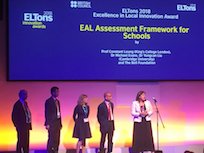
At its core are two sets of EAL assessment descriptors (one set for primary and one set for secondary), a progress tracking planner and a suite of supporting strategies. The Framework is made available free of charge to all schools, local authorities and professional organisations in England and free for download to support teaching, planning and monitoring in schools.
The ELTons are hotly contested awards, with 110 national and international submissions this year, of which only 28 finalists were selected. From these an independent judging panel selected five category winners.
Symposium on Cognitive Approaches to Children’s Literature – book now

The Centre, part of Cambridge University’s Faculty of Education, will be hosting the 4th Cambridge Symposium on Cognitive Approaches to Children’s Literature on Thursday 5 July, 2018.
Cognitive approaches to literature is a relatively new but fast-developing field which draws on areas including psychology, neurology, and literary criticism. Over the past decade it has become an exciting and growing presence in children’s literary studies, explored in many articles, conference talks, and monographs. Because of the field’s interdisciplinary nature, this event will include not only children’s literature scholars but speakers whose research across a variety of areas informs the field.
Professor Lisa Zunshine (University of Kentucky) will present the keynote, and the three panels – Embodiment and Cognition, The Lens of Character, and Readerly Responses – include papers on themes including script and schema theory in Harry Potter and the Cursed Child, developing reciprocity through digital personalized books, and the use of children’s fiction in EmpathyLab’s programme for primary schools. Professor Maria Nikolajeva (University of Cambridge) will deliver the closing remarks.
“We're very excited to welcome Lisa Zunshine, one of the most prominent scholars in cognitive approaches, as our keynote,” said Anna Purkiss, a first-year PhD student in the Children’s Literature Research Centre and one of the organisers of the symposium. “I'm also looking forward to hearing speakers from a variety of backgrounds present on a range of fascinating topics within this quickly developing field.”
Registration opens at 8:30am, and closing remarks are due to end at 5pm.
Venue:
Donald Macintyre Building, Rm 1S3
Faculty of Education
184 Hills Road
Cambridge
CB2 8PQ
SUPER partnership with Chartered College of Teaching
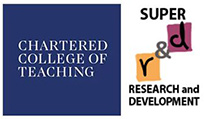
Launch of African Education Research Database - raising visibility and impact of African education research
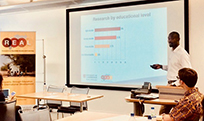
The African Education Research Database is a curated collection of over 2,000 studies from 49 countries in the region. It spans the life-course from early childhood to tertiary education, encompassing the full range of educational themes, from literacy to school feeding.
The database, developed by Pauline Rose, Rafael Mitchell and Samuel Asare, is the result of a fruitful collaboration with the charity Education Sub Saharan Africa (ESSA).
The database launched in Paris on June 15th 2018 at an event hosted by the French Development Agency. The next phase of this project, funded by Jacobs Foundation, will involve synthesising findings from across the research evidence base, and identifying gaps, priorities and partners for future research.
BA Education | Exciting new papers added across the tracks
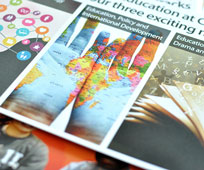
Festival of Education 2018 | Event Livestream
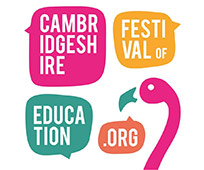
EdD student wins 2018 BELMAS Reflective Practice Award

Steph will be accompanied by the student researchers who feature in her work and they will discuss the development of the student learning community within Passmores Academy.
How stuff gets made - outreach days in primary schools
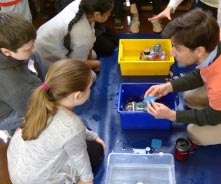
Fantastical Maps and Poems - Curious art exhibition at the Faculty

Real Centre hosted Pre-Global Disability Summit Workshop

The ‘Pre-Global Disability Summit Workshop on Inclusive Education’(26th-27th April 2018) brought together 35 individuals from key bi- and multi-lateral agencies including World Bank, UNICEF, UNESCO-IIEPP, International Non-Government organisations including Sightsavers, Light for the World, Humanity and Inclusion and Disabled People’s Organisations including United Disabled Persons of Kenya to work together to help inform discussions that will take place at the first the Global Disability Summit to be held in July 2018.
The Summit will be co-hosted by the Department for International Development (DFID, UK) and the International Disability Alliance (IDA). It will bring together global leaders, civil society and the private sector to tackle barriers that prevent people living with disabilities from reaching their full potential. The workshop was funded by the Impact Initiative for International Development and an ESRC Impact Acceleration Award, awarded to Dr Nidhi Singal, Reader in Education at the Faculty of Education, University of Cambridge.
Evidence of young people's mental health in schools
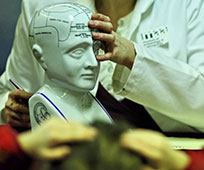
Professor Gordon Harold holds the Andrew and Virginia Rudd Chair and is Professor of Child and Adolescent Mental Health in the School of Psychology at the University of Sussex.
Professor Harold's primary research interests focus on examining the impact of early rearing adversities (e.g. inter-parental conflict, negative parenting, parent mental health) on child and adolescent mental health (e.g. depression, anxiety, conduct problems), the interplay between genetic factors, pre-natal, post-natal rearing experiences and children's mental health, and translating research-led recommendations to practice and policy contexts.
Faculty of Education
Donald McIntyre Building (DMB)
Room GS5 | Wednesday 16th May 2018 | 16.00-18.00
All welcome
Please register attendance on Eventbrite
ERI and NIS celebrate 10 year partnership
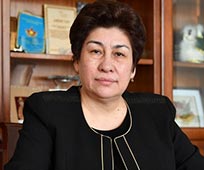
To help celebrate the occassion ERI welcome you to join them for a lecture and discussion by Kulyash Shamshidinova, Chairwoman of NIS with esteemed guests of honour from NIS.
Thursday 26 April 2018
Faculty of Education
Donald McIntyre Building (DMB)
Room GS5 16.00 - 18.00 Followed by a drinks reception.
Registration | Free - Please register on Eventbrite
Strengthening the Connections between Leadership and Learning
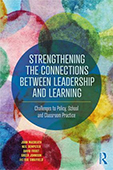
Making a case for a radical reappraisal of leadership, learning and their interrelationship in educational policy, this book extends the original research first published in Connecting Leadership and Learning (2009).
To help celebrate the occasion, LfL welcome you to the book launch and drinks reception:
Wednesday 25th April, 5.15 - 6.30pm
Faculty of Education
Donald McIntyre Building (DMB)
Room GS5
Free - please confirm attendance to lfl@educ.cam.ac.uk
Talking evolution with PGCE trainees
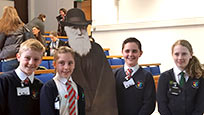
Recently the Faculty welcomed some visiting lecturers (and their class teacher!) to discuss learning about evolution with our primary teacher trainees.
Four Year 6 students from Buckden Primary School took part, explaining what they have learned about evolution as part of their science curriculum. They were supporting a lecture given by Rosie Burns, a former Faculty of Education PGCE trainee who is now their class teacher. All involved learned a great deal about teaching and learning in this important subject.
New UPCA Accredited Counselling Programme Launched
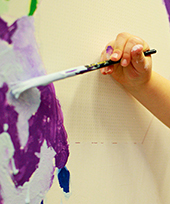
The new Postgraduate Diploma builds on 30 years of experience delivering courses in this area, and provides specialised teaching supporting those who wish to work therapeutically with children and young people.
Read more details about the Full Diploma course.
Exploring the construct of empathy
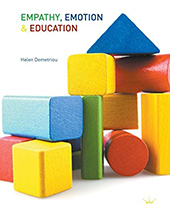
Newly published book Empathy, Emotion and Education by author and Faculty Teaching Associate Helen Demetriou explores the construct of empathy and its connection with education.
Charting literature on the origins and evolution of the concept of empathy, Helen examines the multifaceted nature of empathy and the external and internal influences behind this concept.
Find out more and purchase as ebook or hardback from publishers Palgrave Macmillan
eBook ISBN: 978-1-137-54844-3
Hardcover ISBN: 978-1-137-54843-6
Livestream of REAL Centre Conference
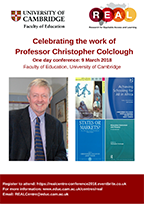
University to host Education, Psychology and Learning Subject Masterclass
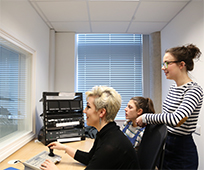
The Masterclass will consist of two academic sessions, exploring Education and Psychology and giving students the opportunity to explore topics of interest beyond what's covered within the school curriculum.
The students will also have an admissions session, giving them an introduction to the University of Cambridge.
Find out more and book your place
For further information about the event, contact Eve Berwin at outreach@educ.cam.ac.uk
PhD is turned into educational guidelines for a nation
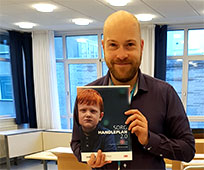
Fiona Maine awarded €4.4million Horizon 2020 grant

Fiona Maine has been successful in her application to the Horizon 2020 EU Research and Innovation programme and awarded €4.4million to conduct research exploring the cultural literacy learning of young people in Europe through their responses to visual texts.
DIALLS (Dialogue and Argumentation for cultural Literacy Learning in Schools) is a three year project starting June 2018, working with Early Years, Primary and Secondary schools across Europe.
Celebrating the work of Professor Christopher Colclough. One day conference:9th March 2018

A one-day conference celebrating the work of Professor Christopher Colcloughwill take place at the University of Cambridge on 9 March. You can find futher information about the event and sign up on Eventbrite.
REAL Centre Seminar Series. Lent Term 2018
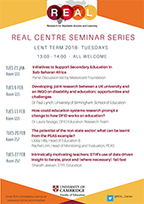
Guardian University Guide 2018 - BA Education ranked number one
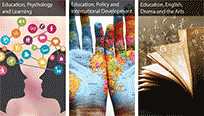
Cambridge digs in at the top of the university league table
The undergraduate Education course allows students to followone of the following three tracks, combining in-depth study of a particular field of interest with an examination of wider educational and social issues.
- Education, Psychology and Learning : focusing on education from a psychological perspective; exploring human development and education in a variety of social and cultural environments.
- Education, Policy and International Development :considering historical and contemporary discussions concerning these areas, and education’s role in economic and social change.
- Education, English, Drama and the Arts : combining the study of English literature, and the option of studying practical Drama, with key issues in education, such as debates around creativity, learning and culture.
If you would like to learn more about the undergraduate education course, or have any questions, contact Eve Berwin at outreach@educ.cam.ac.uk
Faculty Librarian Angela Cutts - 25 Years of Service
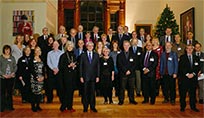
To celebrate her 25 years of service, Angela was invited to a prestigious reception with other long serving members of the University and was presented with a certificate by the Vice Chancellor, Professor Stephen Toope.
'Become A Brilliant Trainer' Book launch
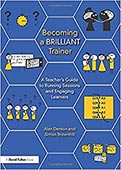
There is a copy of the book on display in the Faculty Library. Digital, paperback and hardback copies are available to purchase from Routledge and Amazon.
CORERJ Volume 5 Call for submissions - Now Open!
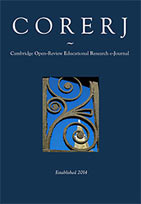
Cambridge Open-Review Educational Research e-Journal CORERJ is now open for submissions of papers for Volume 5, celebrating five successful years in publishing. The DEADLINE for this year's volume is JANUARY 15, 2018!
Please read more about the Call for submissions and submit your paper.
PGCE Open Day: 26 January 2018
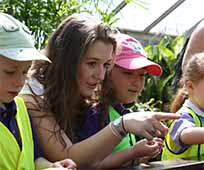
Following the huge success of November's open day, the Faculty is delighted to be hosting a second PGCE open afternoon on Friday 26 January 2018.
Prospective applicants will have the opportunity to look round the Faculty, attend a course presentation and meet members of our teaching and admissions teams.
Find out more about the event and how to register.
Cambridge cracks measurement of ‘learning gain’
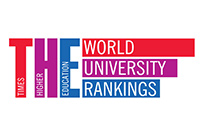
Read more in the Times Higher Education Article Researchers at the University of Cambridge believe they are a step closer to cracking the measurement of students’ “learning gain”.
Article by Chris Havergal Twitter: @CHavergalTHE
Modern Languages postgraduate wins national teaching prizes
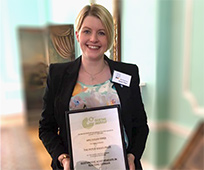
Congratulations to Dawn Piper, ex PGCE and MEd student, whose outstanding teaching has been recognised in two national awards.
First, Dawn won The Association for Language Learning Secondary Teacher of the Year award for 2017. In addition, this year the German Embassy presented her with The Peter Boaks prize for excellence in German teaching.
Dawn is currently Head of Languages at a school in Derby, and credits the "inspirational teaching" at Cambridge as key to her continuing career success.
World Innovation Summit For Education - Nidhi Singal and Hannah Ware present report
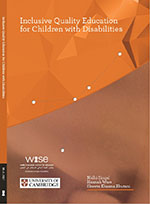
Findings of the report were covered Hindustan Times (a national newspaper in India) and Schools Week (a leading British education newspaper). The Report was also featured on the University of Cambridge's website.
Diane Reay speaks in todays Guardian about inequality in education
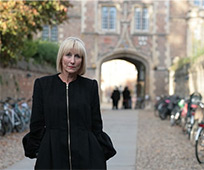
REAL Centre informs cross-party report calling for “significant spending” on early-years education

Faculty and Peking University partnership in Early Years Education
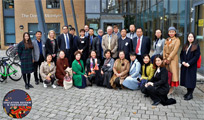
Delegates from China's Peking University have made a visit this November to the Education Reform and Innovation Team at the begining of a long-term cooperation for Early Years Education.
The University of Cambridge Faculty of Education wishes to promote further academic and research links with the China Center for Strategic Studies at Peking University, a partnership which was initiated in April 2017.
The focus on this visit is to develop kindergarten head teachers and early year professionals' understanding of education in the UK as well as surrounding policy.
This visit consisted of lectures in the Faculty as well as visits to local schools looking at the importance of indoor/outdoor environments as well as 'physical' areas of learning and integrated practices. This will be followed up with a research and scoping visit of the ERI team to Beijing and Jinan in January 2018, before moving onto a long-term agreement with regular visits and interaction.
The ERI team is grateful for the help of PhD Students from the Faculty of Education that have assisted with translation and interpretation.
Choreographies of Class

The Culture, Politics and Global Justice (CPGJ) Research Cluster invites Staff and Students at the Faculty of Education to attend the Panel on "Choreographies of Class: Elite Formation in a Transnational World”
Presenters Prof. Jane Kenway, from the University of Melbourne, Australia; and Prof. Debbie Epstein, University of Roehampton.
Response: Professor Marilyn Strathern, Anthropology, Cambridge.
The Panel will take place at DMB Room GS5, from 3.00- 5.00. A wine reception will follow. All welcome. No need to RSVP.
Add this event to your list on talks.cam
Graduate Open Days: Paths to the Faculty of Education
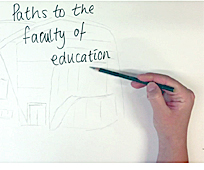
There are various paths to graduate studies at the Faculty of Education. Read more on the FERSA blog why some of our students decided to come to Cambridge for graduate studies in education.
Read more about FERSA, the Faculty of Education Research Students Association.
@fersacambridge
instagram.com/fersacambridge/
facebook.com/fersacambridge/
REAL Centre Seminar Series - Professor David Hulme
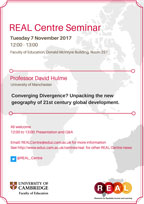
Date: Tuesday 7 November
Location: Room 2S7, Faculty of Education, Donald McIntyre Building, 184 Hills Road, Cambridge, CB2 8PQ
Title: Converging Divergence ? Unpacking the new geography of 21st century global development.
All welcome - please join us 12:00-13:00
See https://talks.cam.ac.uk/talk/index/93478 for more information
School choice in England–who chooses where and why?

PGCE-MEd student Kate Stockings features on TV
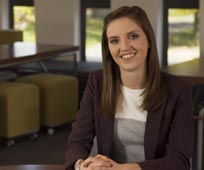
The 'Get Into Teaching' campaign have recently released a TV advert featuring teachers speaking about their reasons for choosing teaching as a career. We are excited to report that one of the teachers featured is former Cambridge PGCE Geography trainee and current MEd student Kate Stockings.
Kate is now in her third year of teaching, and is already in her second year as Head of Geography.In addition to featuring in the TV advert, Kate has written a fantastic blog post for the the Get Into Teaching campaign giving advice to those who are considering a career as a teacher. This comes at a fantastic time, as the application process for teacher training programmes, including our PGCE courses, has just opened. In her blog, Kate talks about the wonderfully varied nature of life as a teacher and the fact that she thrives on learning new
things every day. She also highlights the great opportunities for career progression that the teaching profession offers.
If you want to hear more you can follow Kate on Twitter, a platform which she regularly uses to share innovative teaching ideas and engage with others in the profession.
Visit our PGCE pages to find out more about our PGCE courses.
REAL Centre Seminar Series Professor Elaine Unterhalter
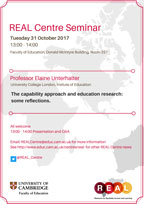
Education to host the 15th edition of Corpus Linguistics
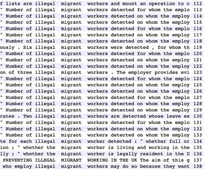
The main focus of this edition is the use of corpora as a research method and the methodological changes over the years. Researchers from all over the UK, Italy, Spain, Austria and Brazil will discuss how corpus research methods can be improved and fine-tuned.
Corpus-linguistics research methods offer ways to look at communication through the analysis of large collections of texts and, particularly, examines the role of lexico-grammatical frequency and patterning phenomena across corpora of L1 and L2 language. The applications of corpus-research methods go beyond the realms of applied linguistics and currently many disciplines in the social sciences or computer science are gaining insight into how the combinatory nature of language informs language-related variation across language registers and domains.
CLS15 showcases research from different areas of inquiry and, among others, will look at trolls in political blogs, the narratives of Magdalane Laundries survivors, pragmatics in L2 education, or the new spoken British National Corpus 2014.
CLS15 is sponsored by PLACE academic group and Cambridge University Press.
BBC WORLDHACKS - Psychological benefits of Viking re-enactments
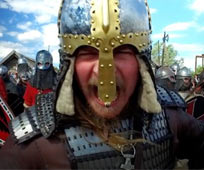
In this episode Carol Holiday from the Faculty of Education gives her opinion on the power of play acting in therapy.
Homerton Santander Award for Outstanding Achievement in PhD

Babatunde is undertaking a very interesting study of two FE colleges, which is an under researched area in education. He is focusing on the colleges’ implementation of the Equalities Act which is of course a crucially important and timely topic given the inequalities that we observe in the FE sector.
Gaining access to these colleges to conduct his work has proved difficult and Babatunde has had to revise his research design. Rising to this challenge, Babatunde showed commendable persistence in his work. He has also done particularly well in writing up and disseminating his research design, including presenting his work at an ESRC poster session and being highly commended for its quality.
CORERJ Educational Research e-Journal Volume 4 - now online!

Volume 4 of the Cambridge Open-Review Educational Research e-Journal(CORERJ) is finally live!
CORERJ is the Faculty of Education's online student journal. It forms a platform for students to share ongoing or completed work with peers and and the wider academic community. This year, we are particularly delighted to publish our first ever Special Paper - an interview with Professor Susan Robertson (Faculty of Education, University of Cambridge), on publishing in academic journals.
FERSA Blog - calling all new graduate students
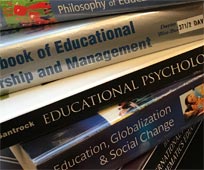
This week we welcome a new cohort of graduate students to the Faculty of Education. The FERSA blog has recently published two blog posts with relevant advice for new MPhil students and PhD students.
The FERSA blog editors, Tyler Shores, Stine Ravnå and CJ Rauch say:
“Embarking on graduate studies is exciting, but also somewhat daunting. We therefore hope that the FERSA blog can be a useful resource for new students, offering insights, ideas and advice on various aspects of the graduate research journey".
